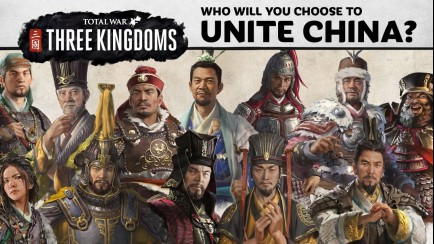


Liu Bei’s journeys would take him across China fighting revolts and bandits, or leading the peasantry away from war-torn territories. His two sworn brothers were the ferocious Zhang Fei and peerless Guan Yu. This man was Liu Bei, a descendant of the founder of the Han Dynasty. When a sandal-maker saw innocents were suffering, he swore an oath with two other men to become brothers in fighting to give the people a better future. Unfortunately, this great upheaval was but the first of many that would follow. Against the greatest people of the age, Zhang Jiao and his Yellow Turbans could do nothing but perish. Arrayed against Zhang Jiao and thousands of frenzied peasants and vagabonds was the might of the Imperial Army and various commanders - Liu Bei, Cao Cao, Sun Jian, Dong Zhuo, and Lu Bu. This gathering storm also introduced us to the personalities who would shape the land in the decades to come. The masses flocked to him due to his miracles and soon Zhang Jiao had an army. He believed himself to be the bringer of a righteous and just rule for the people.

It was in the form of the Yellow Turban Rebellion, led by a mystic known as Zhang Jiao. Storms, earthquakes and strange omens precipitated an impending doom. The “Mandate of Heaven,” which the Chinese believe to be the divine right to rule by the emperor, was in doubt. That aforementioned empire is the Han Dynasty whose power slowly waned. The story takes place in China from 169 to 280 AD. From there, these three factions would experience their own internal and external strife until the land is united once more. The novel’s central theme is “A land united must divide a land divided must unite.” An empire which enjoyed centuries of prosperity will fragment into various fiefdoms ruled by warlords and clans until such time that only three kingdoms remained. So for those unfamiliar with this tale, I’ve put together a lore guide to help prepare you for what is to come. Next year, for the first time, the Total War franchise will take its turn at adapting Guanzhong’s masterpiece, potentially opening it up to a new player base who have yet to experience the saga of Lu Bu, Cao Cao, and the rest of the figures who warred across China. It’s a prolific story, one that has been told time and time again in a variety of video games, most notably the aforementioned Romance of the Three Kingdoms series and Dynasty Warriors. “Sanguozhi” is highly different from Guanzhong’s vision - after all, the man was a known “Han Dynasty fanboy” which meant that he painted characters in a certain shade due to his political leanings. It’s more realistic and grounded, which means it cuts down the myths and legends of the time. In contrast to the fictional recounting of “Sanguo yanyi,” the “Sanguozhi” ( Records of the Three Kingdoms) has a more straightforward description of historical events and characters. Mix in some comic book bravado, cartoonish humor, battle reports, traditional folklore, and moral lessons - that’s the wildly imaginative result Three Kingdoms is. It’s like if the Odyssey and the Iliad were melded with the War of the Roses and was set in China. It’s part history encyclopedia, part soap opera, part myth. Characters did exist during that time period, but at the same time, Guanzhong gave some superhuman strength, preternatural senses, and awe-inspiring intellect. I believe the reason why Three Kingdoms captured my imagination was because it blended historicity and fantasy. It became a cultural phenomenon, considered as one of the “Four Pillars of Chinese Literature” alongside Journey to the West, Dream of the Red Chamber, and Water Margin the latter of which is rumored to be another of Luo Guanzhong’s works. That book is called “Sanguo yanyi” ( The Three Kingdoms Narrative / Romance of the Three Kingdoms), written by Luo Guanzhong in the 14th century. It didn’t matter, 10-year-old me teared up when I got the book. It was an old copy complete with frayed edges and stained pages. I knew I had to get it so my mom and I roamed around Manila to look for a copy. I couldn’t understand the strategy and management sim mechanics at first, but I grew to love the story and the characters. I was a kid when my dad bought Koei’s Romance of the Three Kingdoms II for the SNES. The story? Romance of the Three Kingdoms. It just so happens one particular story heavily influenced me in my youth, pushing me into more historical discoveries. Why do you think I write about Timeless so much? Hand me a book about the Crusades, the Byzantine Empire, the Spanish Inquisition, or the Sengoku Jidai, and I’d probably devour them whilst ignoring the world. I’m also an absolute dork when it comes to history. If I haven’t been clear before, I’m Asian. Pursue historical knowledge, but do not pursue not Lu Bu


 0 kommentar(er)
0 kommentar(er)
